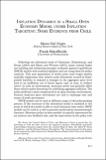Artículo
Inflation dynamics in a small open economy model under inflation targeting: some evidence from Chile
Date
2009Abstract
Following the influential work of Christiano, Eichenbaum, and Evans (2005) and Smets and Wouters (2003), many central banks are building and estimating dynamic stochastic general equilibrium (DSGE) models with nominal rigidities and are using them for policy analysis. This new generation of sticky price (and wage) models typically emphasizes that relative price distortions caused by firms’ partial inability to respond to changes in the aggregate price level lead to an inefficient use of factor inputs and, in turn, to welfare losses. In such an environment, monetary policy can partially offset these relative price distortions by stabilizing aggregate inflation. The policy problem is more complicated in an open economy environment, because domestic price movements are tied to exchange rate and terms-of-trade movements.
Collections
View/


